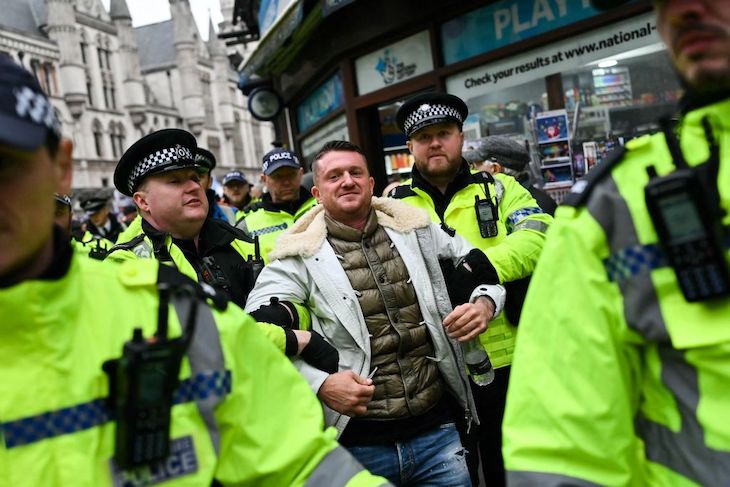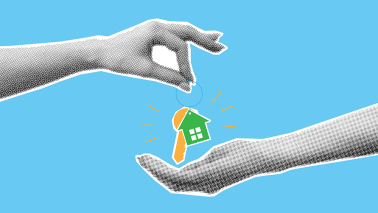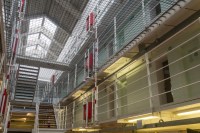Tommy Robinson has lost his attempt to force the prison service to move him out of segregation. Robinson’s lawyers said he is being held in ‘inhuman’ and ‘degrading’ conditions at HMP Woodhill in Milton Keynes. But the High Court ruled that Robinson, also known as Stephen Yaxley-Lennon, was being kept away from other prisoners for his own safety.
Robinson is actually rather lucky: in many ways, his treatment behind bars is far better than the typical inmate receives
Robinson’s supporters have reacted with predictable fury. Are they right to be angry? Is Robinson the victim of a justice system determined to crush his will, which is treating him far more harshly than it does other prisoners? Based on my experience as a prisoner, as a prison inspector and someone who now studies and writes about the prison system, Robinson is actually rather lucky: in many ways, his treatment behind bars is far better than the typical inmate receives.
Robinson was jailed on 28 October 2024 for repeatedly breaching an injunction preventing him from falsely claiming that a Syrian refugee had assaulted a young girl. The court order was made after Robinson lost a libel action brought by that refugee. Initially sent to HMP Belmarsh (a jail with a high Muslim population), he informed staff that ‘his conflict is with followers of Islam’ and was moved to HMP Woodhill on 1 November. Woodhill is a ‘B Cat’ ‘Training’ prison, housing B and C category prisoners. Robinson is categorised as ‘C’, meaning he isn’t suitable for the lowest security, open jails. His lawyers were not challenging that categorisation.
When Robinson arrived at Woodhill, he was placed in a segregated wing, because the prison believed he might be at risk from other inmates. Around 35 per cent of prisoners at Woodhill are Muslim. The jail was also worried that other prisoners allowed to associate with him might be targeted. This wasn’t an unfounded concern: they was specific intelligence that two other prisoners were plotting to assault Robinson, and that a life sentence prisoner was planning to kill him.
On 13 November, the prison offered Robinson a move to a ‘vulnerable prisoners’ unit in another jail. He refused as he didn’t want to, in his words, ‘live with sex offenders’, who typically make up a significant portion of the population on these wings.
So, since November, Robinson has been on an unpopulated wing. Social isolation of this kind is very hard to deal with, and does impact a person’s mental health over time. But it seems the prison has done its best. Robinson has eight hours of visits a week. This is far more than typical; a convicted prisoner can expect two hours a week.
Robinson is spending 21 hours locked in a cell. But, rather depressingly, he is not alone in doing so: many prisoners in this country spend up to 22 hours a day shut in their cells. At Woodhill’s last inspection, men were typically spending under three hours a day out of their cells. In any event, Robinson is now spending a few more hours out of his cell each day as he’s taken a ‘painting and decorating’ job. He’s also being visited every day by healthcare and chaplaincy staff, a level of attention which almost no other prisoners receive.
I don’t wish to minimise the harm done by such long periods of time alone. When I was a prisoner at Wandsworth during the Covid lockdown, I saw what 23 or 24 hours a day ‘behind the door’ did to men, particularly those in single cells.
Yet, while I’m often very critical of the Prison Service, it’s very hard to see what else they could do in the case of Tommy Robinson. Prisons are supposed to keep prisoners safe. As I’ve written before, they often fail at this, but that is supposed to be one of their purposes.
In Tommy Robinson, they have a high-profile prisoner, who is the subject of credible death threats and yet refuses to be housed on a vulnerable prisoners wing. They’ve provided him with far more social visits than another prisoner in his situation would receive. The authorities seem determined to keep him safe from harm.
So what else could they do in this situation? Robinson is not seeking recategorisation that might allow him to transfer to a lower category prison. Placing Robinson on a main wing might result in him being attacked or even killed. If that happened, then those claiming he’s being victimised by the British state would claim the attack as proof.
Is Robinson a victim of the state? It certainly doesn’t seem so. While his conditions in jail are far from pleasant or healthy, that’s very much a reflection of the state of our prisons, rather than an indication that Robinson is being singled out. Robinson might not realise it, but he is being treated far better than most other inmates.







Comments